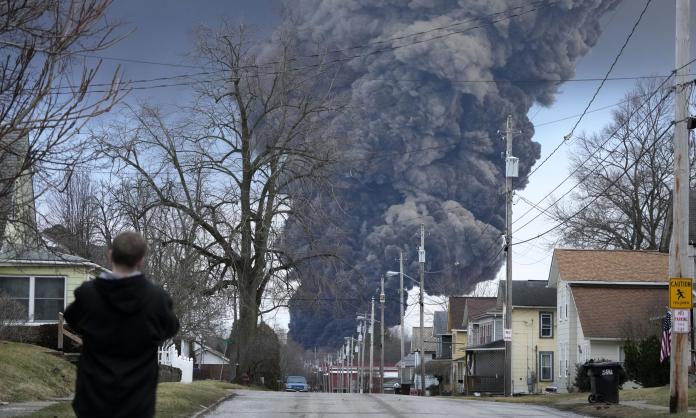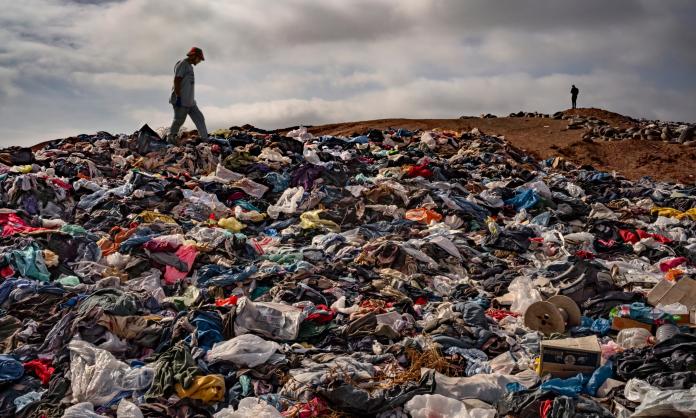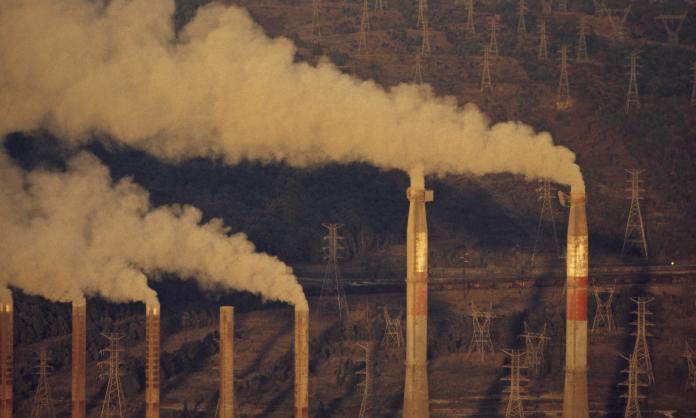Ian Jeffries, CEO of the American Railroads Association, provided witness testimony to a United States Congressional hearing in early February, in which he gloated that American trains were environmentally sustainable, world-leading in safety and working conditions, with further efficiency held back by onerous government regulations.
The next day, a Norfolk Southern train carrying toxic chemicals derailed in the city of East Palestine, Ohio.
Three employees staffed this train, which stretched kilometres and contained thousands of tonnes of hazardous chemicals. The train relied on a braking system first developed in 1968, when carriages were shorter and slower. Norfolk Southern initially championed the innovation of safer electronic brakes, then recoiled from the potential cost of upgrading its freights.
United States unions have blamed the industrial method of “precision-scheduled railroading” (PRS) for the Ohio disaster. PRS involves speed-ups, staff cuts, fewer trains with larger loads and the evasion of maintenance protocols. The Railroad Workers United (RWU), in a 22 February press release, argued that the derailed train experienced a mechanical failure it deemed unthinkable “save for a combination of incompetence and disregard for public safety”. The train was also organised to hold heavy weight towards its rear, which the RWU condemned as “bad practice” and a product of “cut corners”, as it resulted in heavy carriages slamming into lighter ones, worsening the derailment.
“While PRS might help to deliver record profits and all-time low operating ratios ... [w]orkers are vulnerable to ever more hazards and dangers, as are surrounding communities”, Mark Burrows, a spokesperson for the RWU, wrote in a union publication back in 2019.
When the trail derailed in East Palestine, hundreds of thousands of kilograms of chemicals spilled into the land and waterways. Black plumes of toxic smoke wafted over the 5,000 residents. Norfolk Southern decided to initiate a “controlled burn” of the substance vinyl chloride, supposedly to prevent a catastrophic explosion. Residents were briefly evacuated.
“We basically nuked a town with chemicals so we could get a railroad open”, Sil Caggiano, a hazardous material specialist, told an Ohio news station on 12 February.
Phosgene, which had been used as a chemical weapon during World War I, was among the chemicals released into the atmosphere by the burn. In the 3 March Guardian, toxicologist Stephen Lester wrote, “It is well documented that burning chlorinated chemicals like vinyl chloride will generate dioxins”, a group of extremely dangerous chemicals that, among other things, were one of the deadliest poisons in the notorious Agent Orange of the Vietnam War. Thousands of dead fish washed up on waterways in the days following the burning. The Ohio Department of Natural Resources estimated that more than 38,000 small fish and 5,500 other aquatic creatures had died by 23 February.
Weeks after returning home, residents have complained of lingering chemical smells, rashes and headaches and unusual medical symptoms among animals in the farming region: hens laying purple eggs, pigs losing weight and dogs dying. The water in East Palestine was declared safe to drink—by a test Norfolk Southern funded that didn’t comply with federal standards.
“While the world was learning about the horror occurring in East Palestine on television, [Norfolk Southern] officials assessed the damages and carried out their plans for rebuilding their track structure so that they could get trains moving again. After all, if trains are not moving, the railroads are not making (as much) money”, wrote Jonathan Long, a Norfolk Southern employee and chairman of the American Rail System Federation, in a letter to Transport Secretary Pete Buttigieg.
US senators introduced the Railway Safety Act of 2023, partly in response to the disaster, on 2 March. The bill contains a series of measures pertaining to speed restrictions and track standards and suggested imposing a paltry minimum staffing requirement of two employees per train. Absent from the bill is any improvement in conditions for railroad workers.
Last September, the Biden administration signed an eleventh-hour agreement with railroad unions to avert a planned national strike. The deal failed to legislate sick pay or reduce working hours. Rail workers have long complained of isolating and arduous conditions. Trains operate 24/7, and shifts can last eighteen hours. Chronic understaffing plagues the workforce, with 40,000 railroad jobs lost from 2018 to 2020.
Meanwhile, the profits of train bosses have soared. Norfolk Southern boasted an extra US$4 billion in returns last year, while the six biggest railroad corporations recorded more than US$22 billion in total.
Rail derailments are not uncommon in the US. The Federal Railroad Administration suggests that 1,000 occur each year. Some have been deadly and rendered towns uninhabitable. East Palestine, perversely, may have been lucky, partly due to the skilled, rapid action of the three workers onboard the train. Disasters like this will continue so long as profit blinds bosses to the demands—and warnings—of workers.










